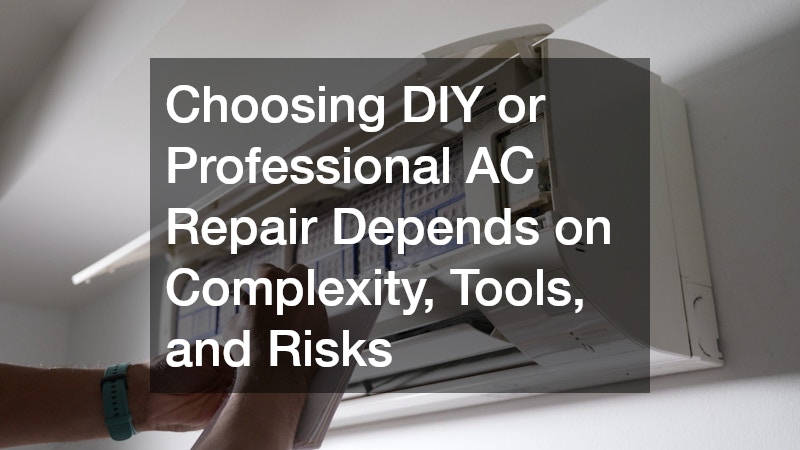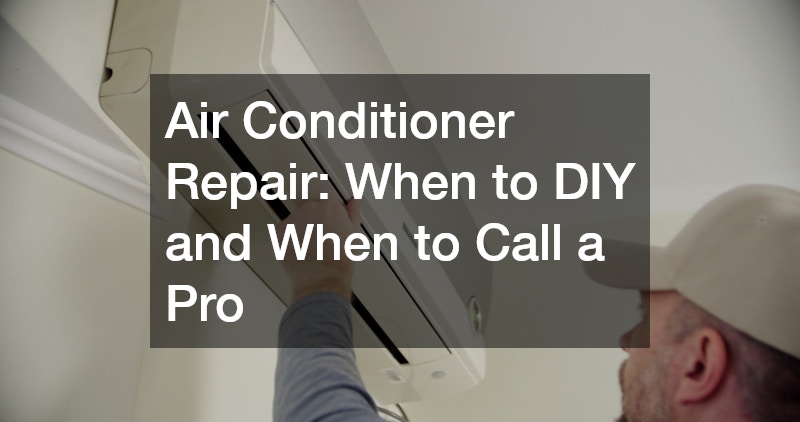In this article, we explore the common dilemma faced by many homeowners: should you attempt to repair your air conditioner yourself, or is it better to call in a professional? We’ll answer some of the most frequently asked questions on this topic to help you make an informed decision.
1. How do I know if my air conditioner issue is a DIY fix?
1.1 Simple Fixes for Common Issues
Air conditioners play a crucial role in comfort during the hot months, and sometimes the issues they encounter are easily fixable by homeowners. Basic troubleshooting such as checking the thermostat settings and replacing the air filter can often resolve many minor inconveniences.
Ensuring that the unit is receiving adequate power and ensuring that circuit breakers or fuses are not tripped can also be part of a basic DIY checklist. Some problems, like unusual noises or lack of cooling, may simply require cleaning the unit’s exterior coils.
Air conditioners can accumulate dirt, which can compromise efficiency, so regular cleaning within safe DIY limits is beneficial. However, always ensure the unit is completely powered off before attempting any maintenance, ensuring personal safety.
1.2 Safety Concerns and DIY Limitations
Although DIY repairs can save money, it’s crucial to recognize the limitations of self-repair to avoid potential hazards. Electrical components pose a significant risk and should only be handled by individuals with a thorough understanding of the unit’s electrical scheme.
Additionally, handling refrigerants requires specialized knowledge due to their potential harm to both health and the environment. EPA regulations dictate proper handling and disposal of refrigerants, underscoring the complexity of certain repair tasks.
Safety regulations not only protect you but also ensure the longevity of your air conditioner system. Thus, recognizing these limitations is important in preventing further damage and maintaining the unit’s efficiency.
2. What are the signs I need to call a professional?
2.1 Indicators of Complex Problems
When your air conditioner frequently cycles on and off or won’t turn on at all, these are signs of deeper mechanical issues. Such problems include electrical failures or compressor malfunctions that require professional diagnosis and repair.
Unpleasant odors and excess moisture are also red flags, possibly indicating mold formation or refrigerant leaks. These issues not only affect comfort but also pose health risks and demand professional intervention.
Finally, when you notice consistent inefficiencies despite performing basic maintenance, it’s wise to consult with an HVAC professional. They can assess potential hidden damages or faults that an untrained eye might overlook.
2.2 Cost vs. Value of Professional Services
The costs of professional air conditioner repairs can vary greatly depending on the complexity of the issue. It’s imperative to weigh these costs against the longevity and efficiency improvements a professional could ensure for your unit.
Professionals bring with them years of experience and specialized tools, which significantly increase the chances of a successful and lasting repair. Additionally, they can provide warranties on their services, adding an extra layer of security and peace of mind.
Opting for professional repairs can ultimately save money by increasing energy efficiency and preventing frequent breakdowns. Thus, investing in professional expertise can be a wise decision for the future wellbeing of your air conditioning system.
3. What tools and knowledge are necessary for DIY air conditioner repairs?
3.1 Essential Tools for Air Conditioner Maintenance
Having the right tools is essential for performing basic air conditioner maintenance and minor repairs. Common tools include a multimeter for electrical checks, screwdrivers for accessing panels, and fin combs for straightening condenser coils.
A wet-dry vacuum is also useful for clearing blockages in drain lines, while a regular cleaning schedule can keep the unit flowing smoothly. Condenser coil cleaners and bleach can help maintain both indoor and outdoor system components.
These tools, combined with the right knowledge, enable DIY enthusiasts to tackle some maintenance tasks without overreaching. Always ensure that all power sources are secured before engaging in any repair activity.
3.2 Important HVAC Concepts for DIY Enthusiasts
Understanding key HVAC concepts can empower homeowners to undertake basic maintenance tasks effectively. Knowledge of how refrigeration cycles work, including the roles of compressors, evaporators, and condensers, is particularly beneficial.
Furthermore, understanding airflow dynamics, as well as efficiency standards like SEER (Seasonal Energy Efficiency Ratio), helps in better assessing the performance of your unit. These concepts help in identifying symptoms that deviate from optimal operation standards.
While some individuals might handle simple issues on their own, knowing when to call a professional is equally important. The complexity of HVAC systems demands respect for the professional expertise often required for larger, more integral repairs.
Deciding between DIY and professional repair for your air conditioner involves assessing the complexity of the issue, the tools at your disposal, and the potential risks. By considering the insights provided in this article, you can confidently choose the best approach for maintaining your air conditioning system.
.




